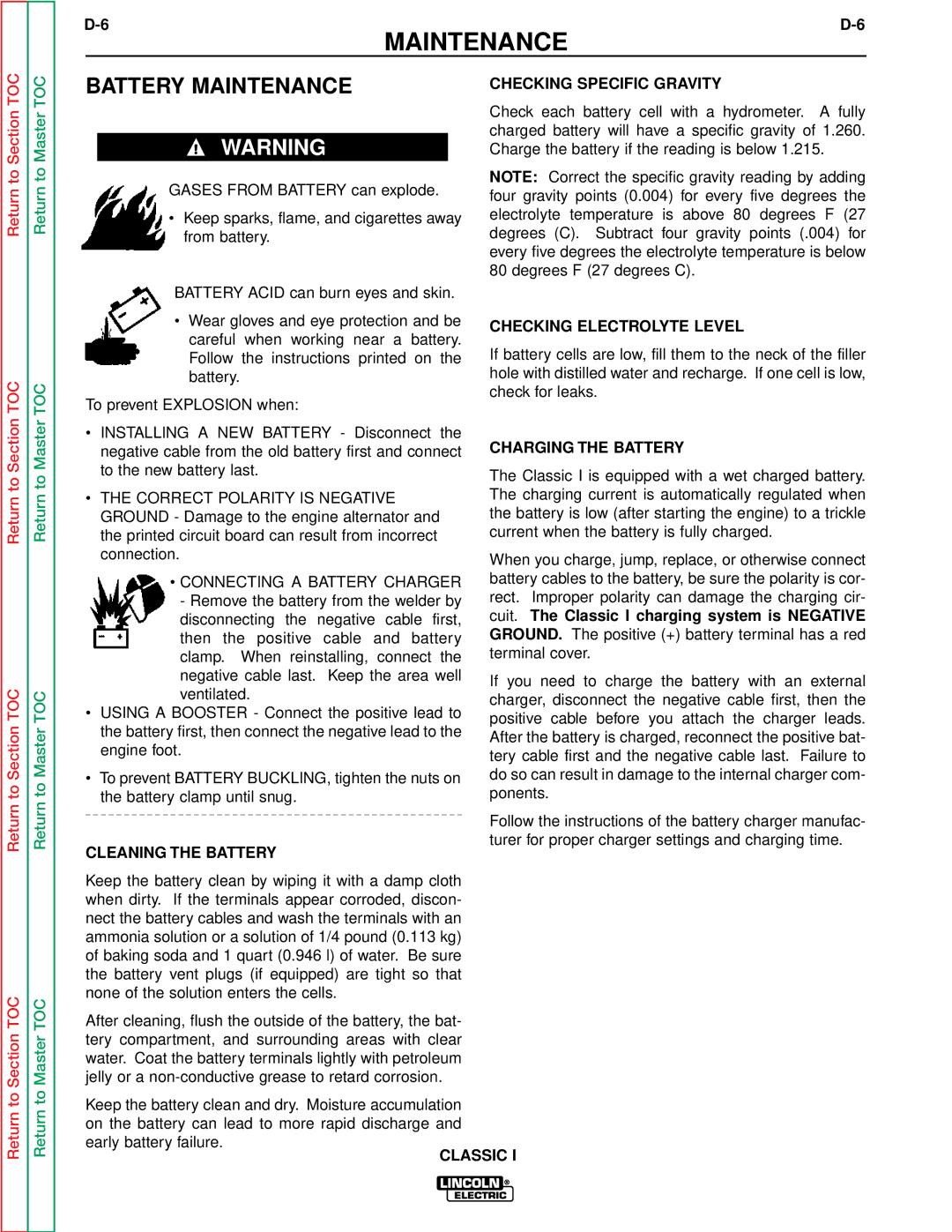
MAINTENANCE
Return to Section TOC
BATTERY MAINTENANCE
WARNING
GASES FROM BATTERY can explode.
•Keep sparks, flame, and cigarettes away from battery.
BATTERY ACID can burn eyes and skin.
CHECKING SPECIFIC GRAVITY
Check each battery cell with a hydrometer. A fully charged battery will have a specific gravity of 1.260. Charge the battery if the reading is below 1.215.
NOTE: Correct the specific gravity reading by adding four gravity points (0.004) for every five degrees the electrolyte temperature is above 80 degrees F (27 degrees (C). Subtract four gravity points (.004) for every five degrees the electrolyte temperature is below 80 degrees F (27 degrees C).
Return to Section TOC
Return to Section TOC
Return to Section TOC
Return to Master TOC
Return to Master TOC
Return to Master TOC
Return to Master TOC
| • Wear gloves and eye protection and be | CHECKING ELECTROLYTE LEVEL | ||
| careful when working near a battery. | |||
| If battery cells are low, fill them to the neck of the filler | |||
| Follow the instructions printed on the | |||
| battery. | hole with distilled water and recharge. If one cell is low, | ||
To prevent EXPLOSION when: | check for leaks. | |||
|
| |||
• INSTALLING A NEW BATTERY - Disconnect the | CHARGING THE BATTERY | |||
| negative cable from the old battery first and connect | |||
| to the new battery last. | The Classic I is equipped with a wet charged battery. | ||
|
| |||
• | THE CORRECT POLARITY IS NEGATIVE | The charging current is automatically regulated when | ||
| GROUND - Damage to the engine alternator and | the battery is low (after starting the engine) to a trickle | ||
| the printed circuit board can result from incorrect | current when the battery is fully charged. | ||
| connection. | When you charge, jump, replace, or otherwise connect | ||
|
| |||
| • CONNECTING A BATTERY CHARGER | battery cables to the battery, be sure the polarity is cor- | ||
| - Remove the battery from the welder by | rect. | Improper polarity can damage the charging cir- | |
| disconnecting the negative cable first, | cuit. | The Classic I charging system is NEGATIVE | |
| then the positive cable and battery | GROUND. The positive (+) battery terminal has a red | ||
| clamp. When reinstalling, connect the | terminal cover. | ||
| negative cable last. Keep the area well | If you need to charge the battery with an external | ||
| ventilated. | |||
| charger, disconnect the negative cable first, then the | |||
• | USING A BOOSTER - Connect the positive lead to | |||
positive cable before you attach the charger leads. | ||||
| the battery first, then connect the negative lead to the | |||
| After the battery is charged, reconnect the positive bat- | |||
| engine foot. | |||
| tery cable first and the negative cable last. Failure to | |||
|
| |||
• To prevent BATTERY BUCKLING, tighten the nuts on | do so can result in damage to the internal charger com- | |||
| the battery clamp until snug. | ponents. | ||
Follow the instructions of the battery charger manufac- turer for proper charger settings and charging time.
CLEANING THE BATTERY
Keep the battery clean by wiping it with a damp cloth when dirty. If the terminals appear corroded, discon- nect the battery cables and wash the terminals with an ammonia solution or a solution of 1/4 pound (0.113 kg) of baking soda and 1 quart (0.946 l) of water. Be sure the battery vent plugs (if equipped) are tight so that none of the solution enters the cells.
After cleaning, flush the outside of the battery, the bat- tery compartment, and surrounding areas with clear water. Coat the battery terminals lightly with petroleum jelly or a
Keep the battery clean and dry. Moisture accumulation on the battery can lead to more rapid discharge and early battery failure.
